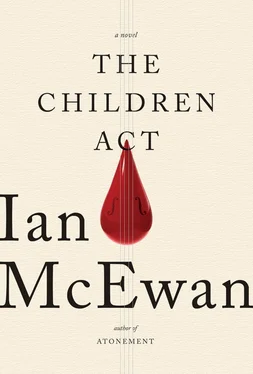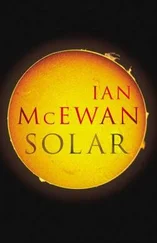“Well,” he said after their long pause. “Wouldn’t you?”
“Not with this gun to my head.”
“Meaning?”
“I shape up or you go to Melanie.”
She assumed he had understood her meaning well enough but had wanted to hear her say the woman’s name, which she had never spoken out loud before. It evinced a tremor or a tightening in his face, a helpless little tic of arousal. Or it was the naked phrasing, the “go to.” Had she lost him already? She felt suddenly dizzy, as though her blood pressure had dipped, then soared. She pushed herself upright on the chaise longue, and set down on the carpet the page of the judgment still in her hand.
“That’s not how it is,” he was saying. “Look, turn this around. Suppose you were in my place and I was in yours. What would you do?”
“I wouldn’t go and find myself a man and then open negotiations with you.”
“What, then?”
“I’d find out what was troubling you.” Her voice sounded prim in her ears.
He gestured toward her grandly with both hands. “Fine!” The Socratic method, as used, no doubt, on his students. “So what is troubling you?”
For all the stupidity and dishonesty of the exchange, it was the only question and she’d invited it, but she felt irritated by him, condescended to, and for the moment she didn’t reply and instead looked past him down the room to the piano, barely played in two weeks, and the silver-framed photos it supported in country-house style. Both sets of parents from wedding day to dotage, his three sisters, her two brothers, their wives and husbands present and past (disloyally, they struck no one off), eleven nephews and nieces, then the thirteen children they in turn had made. Life accelerating to people a small village clustered on a baby grand. She and Jack had contributed nothing, no one, beyond family reunions, near-weekly birthday presents, multigenerational holidays in the cheaper sort of castle. In their apartment, they hosted much family. At the end of the hallway was a walk-in cupboard filled with folded-up cot, high chair and playpen, and three wicker baskets of chewed and fading toys in readiness for the next addition. And this summer’s castle, ten miles north of Ullapool, awaited their decision. According to the ill-printed brochure, a moat, a working drawbridge and a dungeon with hooks and iron rings in the wall. Yesterday’s torture was now a thrill for the under-twelves. She thought again of the medieval sentence, seven weeks and a day, a period that began with the final stages of the Siamese twins case.
All the horror and pity, and the dilemma itself, were in the photograph, shown to the judge and no one else. Infant sons of Jamaican and Scottish parents lay top-and-tailed amid a tangle of life-support systems on a pediatric intensive-care bed, joined at the pelvis and sharing a single torso, their splayed legs at right angles to their spines, in resemblance of a many-pointed starfish. A measure fixed along the side of the incubator showed this helpless, all-too-human ensemble to be sixty centimeters in length. Their spinal cords and the base of their spines were fused, their eyes closed, four arms raised in surrender to the court’s decision. Their apostolic names, Matthew and Mark, had not encouraged clear thinking in some quarters. Matthew’s head was swollen, his ears mere indentations in roseate skin. Mark’s head, beneath the neonatal woolen cap, was normal. They shared only one organ, their bladder, which was mostly in Mark’s abdomen and which, a consultant noted, “emptied spontaneously and freely through two separate urethras.” Matthew’s heart was large but “it barely squeezed.” Mark’s aorta fed into Matthew’s and it was Mark’s heart that sustained them both. Matthew’s brain was severely malformed and not compatible with normal development; his chest cavity lacked functional lung tissue. He had, one of the nursing staff said, “not the lungs to cry with.”
Mark was sucking normally, feeding and breathing for both, doing “all the work” and therefore abnormally thin. Matthew, with nothing to do, was gaining weight. Left alone, Mark’s heart would sooner or later fail from the effort, and both must die. Matthew was unlikely to live more than six months. When he died, he would take his brother with him. A London hospital was urgently looking for permission to separate the twins to save Mark, who had the potential to be a normal healthy child. To do so, surgeons would have to clamp, then sever the shared aorta, so killing Matthew. And then begin a complicated set of reconstructive procedures on Mark. The loving parents, devout Catholics living in a village on Jamaica’s north coast, calm in their belief, refused to sanction murder. God gave life and only God could take it away.
In part, her memory was of a prolonged and awful din assaulting her concentration, a thousand car alarms, a thousand witches in a frenzy, giving substance to the cliché: the screaming headline. Doctors, priests, television and radio hosts, newspaper columnists, colleagues, relations, taxi drivers, the nation at large had a view. The narrative ingredients were compelling: tragic babies, kindhearted, solemn and eloquent parents in love with each other as well as their children, life, love, death and a race against time. Masked surgeons pitched against supernatural belief. As for the spectrum of positions, at one end were those of secular utilitarian persuasion, impatient of legal detail, blessed by an easy moral equation: one child saved better than two dead. At the other stood those of not only firm knowledge of God’s existence but an understanding of his will. Quoting Lord Justice Ward, Fiona reminded all parties in the opening lines of her judgment, “This court is a court of law, not of morals, and our task has been to find, and our duty is then to apply, the relevant principles of law to the situation before us—a situation which is unique.”
In this dire contest there was only one desirable or less undesirable outcome, but a lawful route to it was not easy. Under pressure of time, with a noisy world waiting, she found, in just under a week and thirteen thousand words, a plausible way. Or at least the Court of Appeal, working to an even harsher deadline on the day after she delivered her judgment, seemed to suggest she had. However, there could be no presumption that one life was worth more than another. Separating the twins would be to kill Matthew. Not separating them would, by omission, kill both. The legal and moral space was tight and the matter had to be set as a choice of the lesser evil. Still, the judge was obliged to consider what was in Matthew’s best interests. Clearly not death. But nor was life an option. He had a rudimentary brain, no lungs, a useless heart, was probably in pain and condemned to die, and soon.
Fiona argued, in a novel formulation which the Court of Appeal accepted, that Matthew, unlike his brother, had no interests.
But if the lesser evil was preferable, it might still be unlawful. How was murder, cutting open Matthew’s body to sever an aorta, to be justified? Fiona rejected the notion urged on her by the hospital’s counsel, that separating the twins was analogous to turning off Matthew’s life-support machine, which was Mark. The surgery was too invasive, too much of a trespass on Matthew’s bodily integrity, to be considered a withdrawal of treatment. Instead, she found her argument in the “doctrine of necessity,” an idea established in common law that in certain limited circumstances, which no parliament would ever care to define, it was permissible to break the criminal law to prevent a greater evil. She referred to a case in which men hijacked a plane to London, terrorized the passengers and were found innocent of any crime because they were acting to avoid persecution in their own country.
Читать дальше












